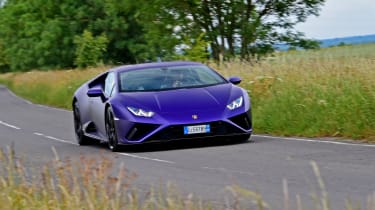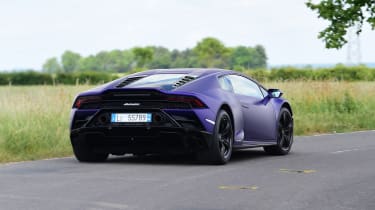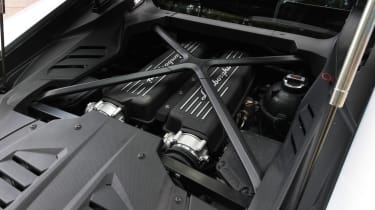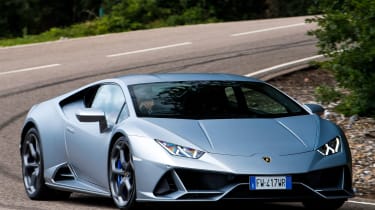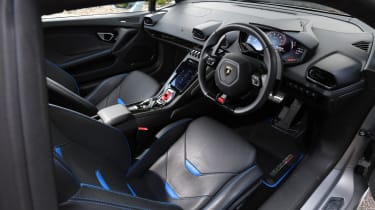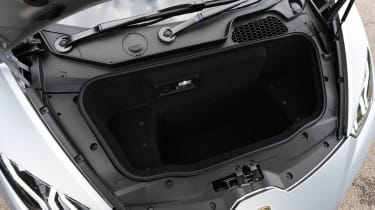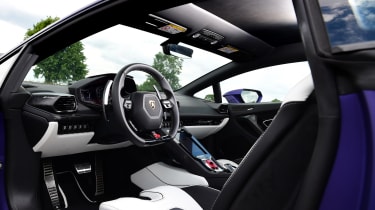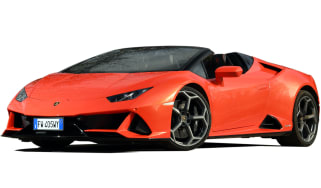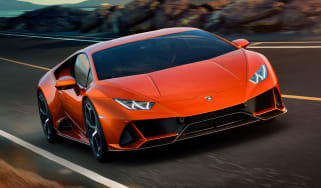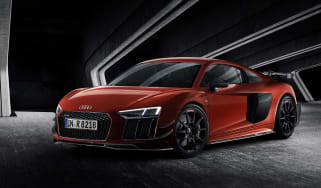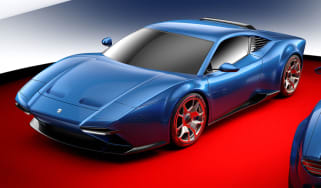Lamborghini Huracan Evo coupe
"The Lamborghini Huracan Evo is everything a supercar should be"
Pros
- The V10 engine
- Astonishing performance
- Dramatic styling
Cons
- Uncomfortable seats
- Steering lacks feel
- Eye-watering option prices
The Lamborghini Huracan Evo is a low, wide, two-door, two-seater coupe with a truly incredible 631bhp 5.2-litre V10 petrol engine. In an age when even supercars are generally using smaller, turbocharged engines, the Huracan stands out by offering a large, raucous, naturally aspirated engine.
The result is arguably the quintessential supercar experience; the Huracan pulls relentlessly from virtually anywhere in the rev range and the soundtrack is nothing short of breathtaking. Lamborghini also makes a convertible Spyder version of the Huracan; the removal of the roof only adds to the car's intoxicating nature.
Added to the range in 2020, the Huracan Evo RWD (rear-wheel drive) is the most exciting version to drive and costs £34,000 less. It feels even more focused and razor sharp at speed, thanks to sweet steering and a 33kg weight reduction, to the point the Evo RWD can almost feel frenetic until you get used to it.
The Huracan is dramatically styled, exhilarating to drive and expensive to run but, along with the Urus, it’s one of the easiest Lamborghinis to live with ever. Taller drivers will find the interior a little tight and luggage space is minimal, but considering the sacrifices and demands Lamborghinis have historically required of their owners, the Huracan is genuinely user-friendly by comparison.
More reviews
In-depth reviews
Carbuyer's best supercars to buy now
If you’re in the market for a Huracan, its rivals include the Ferrari 488, Honda NSX, Aston Martin Vantage, McLaren 570S and Mercedes-AMG GT R. Each takes a very different approach to the junior supercar format and we can only suggest test-driving as much of the competition as time will allow – purely for research purposes, of course.
MPG, running costs & CO2
The Huracan Evo officially manages 20.6mpg. This is roughly on a par with the figures Ferrari quotes for its 488, although the Honda NSX and Porsche 911 are both a bit better.
The Huracan’s 80-litre fuel tank gives it a theoretical range of around 400 miles, but real-world economy and the engine’s willing nature mean this will be tricky to achieve. CO2 emissions of 332g/km are high but par for the course with this type of car, while insurance, tyres and servicing will make four-figure bills a regularity. The car will cost £150 per year to tax, plus a £325 surcharge from years two to six, bringing the total cost to £475.
All of this goes with the supercar territory though and it would be unfair to criticise the Huracan unduly in this regard.
Engines, drive & performance
Driving a Huracan is an event to be savoured. Its steering is sharp and reassuringly accurate, the gearbox rips through gears instantaneously and there is a huge amount of grip, thanks in part to the all-wheel drive system and huge tyres. The star of the show, however, is unquestionably the engine.
The quest for reduced emissions has led many manufacturers – including Ferrari – to turn to turbocharging, but the Lamborghini Huracan features a naturally aspirated (non-turbocharged) 5.2-litre V10. The 'Evo' version of the Huracan was introduced in 2019 and uses the 631bhp version of the engine and the titanium exhaust system from the Performante model of the previous Huracan.
No turbocharging means acceleration is intuitively linear and the Huracan Evo has one of the most exciting engines in terms of performance and soundtrack. In the Huracan's 'Corsa' driving mode, which fully opens the exhaust valves, the noise of the car accelerating is ferocious; by the time you approach the upper end of the rev range, the car is screaming like an F1 car from a bygone era. Bangs and cracks from the exhaust when downshifting sound almost like gunfire - it's all very antisocial but also very enjoyable.
The Huracan comes with three driving modes, selected from an ‘Anima’ switch on the steering wheel. 'Strada' (road) is the softest, with 'Sport' and 'Corsa' (race) sharpening the accelerator, gearbox, suspension and steering, and also affecting how the engine’s power is split between the front and rear wheels.
The car also features a new electronics package called Lamborghini Dynamic Vehicle Integration (LDVI), which controls the car’s four-wheel drive, traction control, torque vectoring and four-wheel steering. It helps the car change direction impressively sharply and there's barely any roll in corners.
The overall result is a truly modern supercar experience that brings the Huracan up to speed with its most accomplished rivals, both in terms of handling and performance. The 0-62mph sprint takes just 2.9 seconds, 0-124mph just nine seconds and the Evo can even brake from 100mph to a standstill in just 31.9 metres.
If you aren't so concerned with statistics, the 602bhp Huracan Evo RWD forgoes four-wheel drive and takes 0.4 seconds longer to do 0-62mph. The result isn't just a £34,000 saving but also a healthy 35kg weight reduction and improved steering feel. In Sport mode the RWD comes alive, feeling somewhat purer than the regular version and still serving up impressive grip.
Interior & comfort
Supercars only have to please the few owners who can afford them, so their designers have free rein when it comes to interior design. The Huracan’s start button, for example, is hidden under a jet-fighter-inspired red flap, reverse gear is engaged by pulling back on a dedicated lever, while the indicators and windscreen wipers are controlled by steering-wheel buttons rather than stalks. Toggle switches to the side of the wheel control the headlights, while the electric windows are operated by more toggles, which you need to push up to make the windows go down, strangely.
The Huracan Evo gets a heavily revised interior with uprated infotainment, including an 8.3-inch touch screen on the centre console that can be used to control a multitude of functions including the car’s set-up via the LDVI system.
The cabin features a digital dashboard display in lieu of traditional dials, and wherever you look, you see hexagons. The air vents, door handles, wing mirror controls, passenger airbag cover, reversing camera surround and exterior grille designs all have six sides. Touches like this that mark the car out as something special, while build and material quality are spot on.
The ride quality is surprisingly comfortable in the Strada driving mode. Naturally, the car feels stiffer than the average hatchback but the suspension is good at rounding off lumpy, cracked road surfaces and it doesn't fidget constantly like some high-performance cars do. This is largely thanks to the immense stiffness of the carbon-aluminium chassis, which allows engineers to fit softer suspension without compromising response or body control.
The main obstacle to comfort over big distances is actually the lack of lower back support from the Huracan's seats. They look great and are finished beautifully, but it only takes an hour or so of driving before the lumbar area of your back starts to ache. This isn't a phenomenon confined to particular shapes or sizes of people either; most people on the test team reported the same problem.
Practicality & boot space
The Huracan is bought for pleasure and prospective owners are likely to have at least one other car for more practical tasks. Even so, anyone over six-feet tall may struggle for legroom inside the Lamborghini, while the rake of the windscreen means tall drivers may need to crane their necks to peer out at traffic lights.
The Huracan has its engine behind the seats, so the boot is located up front. At 150 litres, it’s about half the size of a supermini’s, but there’s definitely enough space in there for weekend bags and a week’s worth of luggage if you don’t mind things getting slightly squashed. There’s also a space behind the seats where you could stash a suit.
Reliability & safety
Being owned by Volkswagen Group means Lamborghini has one of the world’s largest car companies behind it. The Huracan feels very well built, and mechanical and structural components are shared with the Audi R8, so it should be as dependable as supercars get. The all-wheel-drive version gives the benefit of extra grip, while the optional carbon-ceramic brakes endow it with prodigious stopping power. Lamborghini’s four-year/unlimited-mileage warranty is excellent.


